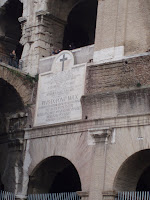 The Colosseum stands among Rome's most iconic images. On a short list of "things to see" in Rome, you'll find the Colosseum without a doubt. However, the question is often why people want to see the Colosseum. For some, it's a matter of historical wonder. For others, it's another great photo op. However, for many Christians who come to Rome on pilgrimage, the Colosseum represents the persecution of Christians off and on throughout the first centuries of the faith at the hands of the Roman empire.
The Colosseum stands among Rome's most iconic images. On a short list of "things to see" in Rome, you'll find the Colosseum without a doubt. However, the question is often why people want to see the Colosseum. For some, it's a matter of historical wonder. For others, it's another great photo op. However, for many Christians who come to Rome on pilgrimage, the Colosseum represents the persecution of Christians off and on throughout the first centuries of the faith at the hands of the Roman empire.It is indeed possible that Christians were killed at the Colosseum. Since it was built between 70 and 80 AD it would have been in high usage in the following centuries, during which there were periods of intense Christian persecution. Also, while the Colosseum did host such events as drama, gladiator shows, animal hunts (with real exotic animals), and even possibly mock naval battles, there were also executions. After all, over 50,000 people could attend events at the Colosseum, and they were often political in nature; it would be an excellent forum to remind people of the rule of the state.
However, to believe that the Colosseum was not only where all Roman Christians were martyred but used primarily for this purpose is inaccurate. In fact, the association with martyrdoms and the Colosseum can be traced only as far back as the 16th century; recovered lists of important pilgrimage sites in Rome before that bear no mention of the Colosseum. Furthermore, through even the Medieval Ages, the Colosseum found various uses as a market, stable, and fortress - hardly a carefully preserved holy site. Saint Ignatius of Antioch, a prominent bishop who was martyred during a period of persecution, is often believed to have been killed in the Colosseum; however, his well-documented imprisonment and death only states that he died in "the arena", of which there were many in Rome.
Nonetheless, the church considers the Colosseum an important religious place. Sure, it's always full of secular school groups and wide-eyed
 tourists, surrounded by a very impious hoard of trinket sellers and panini stands, and subject to a sizable entry fee. It's still the place that the Via Crucis centers on Good Friday services, and still has several crosses positioned both inside and out. Even with the secular historical dimensions, and even without its intense connections to the early Christian martyrs, it is an important place to consider.
tourists, surrounded by a very impious hoard of trinket sellers and panini stands, and subject to a sizable entry fee. It's still the place that the Via Crucis centers on Good Friday services, and still has several crosses positioned both inside and out. Even with the secular historical dimensions, and even without its intense connections to the early Christian martyrs, it is an important place to consider.I can look at the Colosseum and be amazed by 2,000 years of history staring back at me. The technology at the time used to create it, combined with the incredible manpower it required, astounds me. Even the mass of humanity gathered around the place makes me shake my head. However, when I think about it, I realize that even more incredible to me is the faith of a martyr. I would like to believe that if it was required of me, I would assert my faith to the point of death. But in the face of such imminent physical pain, I cannot honestly say. The memory of the martyrs challenges me and reminds me that I do not come to this faith alone - it is only by the grace of God.
God of mercy, we give thanks for the Spirit's constant work in us, building our faith through the grace selflessly given by your Son's death and resurrection. Forgive us, Lord, when we stumble in our faith and deny you in thought, word, and deed. Remind us of those who have praised your name even to their death; save us from such a trial, and give us courage should we face it anyway. In you we have strength. Amen.


